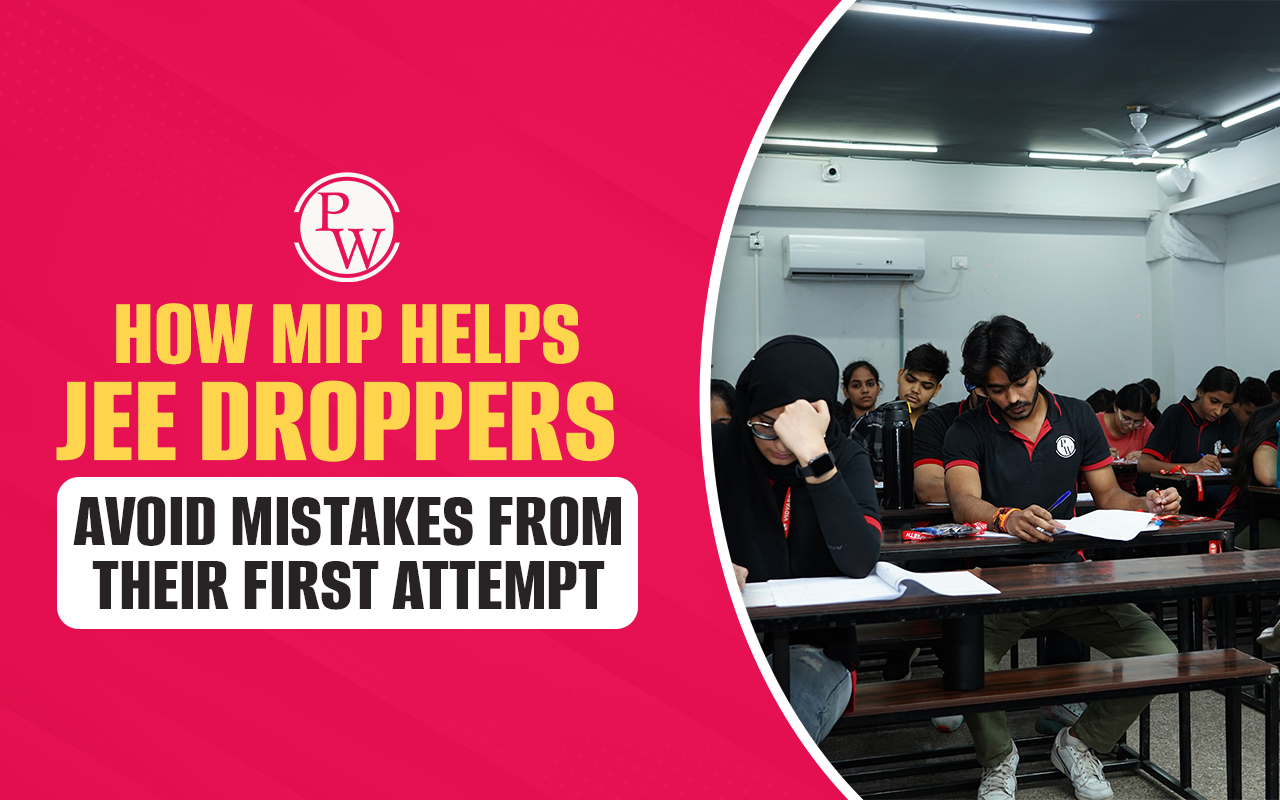

Low JEE Score Reasons: Scoring less than expected in JEE can be really discouraging, especially after putting in months of effort and preparation. But a low score doesn’t mean you didn’t study well, it points out that there are certain gaps in preparation or exam strategy. It is important for students to understand the reasons for a low JEE score to improve their performance.
There are many issues, like a lack of time management in JEE, weak conceptual understanding in JEE, and poor revision habits. The Marks Improvement Program (MIP) by Physics Wallah focuses on fixing these exact issues by combining offline test exposure, All India Test Series (AITS), Real Test experience, doubt support, and structured performance analysis.
10 Reasons You Scored Low in JEE
By identifying these low JEE score reasons and fixing them early, aspirants can avoid repeating the same errors in future attempts. Here are some common reasons for low JEE marks and how they affect your performance:
-
One of the reasons for low JEE marks is poor time distribution across Physics, Chemistry, and Mathematics. Many students spend too much time solving lengthy problems in one subject and end up leaving others incomplete. Even if you know the answers, it is important to prepare every concept thoroughly. You must focus on proper allocation of subjects and practice under timed conditions.
-
Memorizing formulas or shortcuts without understanding concepts leads to poor application skills. JEE tests problem-solving through conceptual questions, and without clarity, accuracy suffers. If you struggle with fundamentals in Mechanics, Organic Chemistry, or Algebra, you might lose marks in application-based problems.
-
Skipping mock tests is one of the most common JEE preparation errors. Without regular practice, students fail to build exam temperament and speed. You must solve 75 questions in 3 hours with accuracy. This way you can work on your answer writing speed.
-
JEE repeats concepts, formats, and even question patterns from previous years’ papers. Ignoring the previous years’ papers can lead to confusion as you won’t understand the exam pattern. Solving PYQs helps in recognizing recurring problem types.
-
While NCERT is important, JEE requires more than textbook-level preparation. If you restrict yourself to NCERT, you will miss out on advanced problem-solving practice.
-
Even well-prepared students sometimes score low in JEE due to exam-day panic. Stress and anxiety affect concentration, leading to silly mistakes in calculation or misreading questions.
-
Revision is as important as learning new concepts. Many students finish the syllabus but fail to revise regularly. Without revisiting formulas, reactions, and theorems, retention drops drastically by exam time.
-
Some students don’t read the given instructions carefully which leads to negative marking. In JEE, even a few incorrect guesses can significantly reduce overall marks.
-
Taking tests without analyzing them is useless. Many aspirants repeatedly make the same mistakes because they never study their test performance in detail. Identifying weak areas, improving accuracy, and working on weak areas through proper test analysis is important for score improvement.
-
Maintaining consistency is also very important. You might follow a structured approach for some days and then don’t study at all. This irregularity leads to incomplete syllabus coverage and poor retention.
How MIP Helps Fix These JEE Preparation Errors?
JEE Preparation errors must be taken into consideration and every aspirant must try to work on their mistakes. The Marks Improvement Program (MIP) directly targets these common mistakes in JEE exam preparation. Here’s how it helps:
-
All India Test Series (AITS): The program provides a national-level ranking system, AIR, detailed analysis, and questions based on the latest exam pattern. It helps students with time discipline and accuracy.
-
Real Test Series: It simulates the actual JEE CBT exam environment. This reduces the exam-day anxiety and boosts their confidence.
-
Offline Batch Tests: It provides structured practice under real exam conditions and focuses on improving consistency and problem-solving.
-
Doubt Support (for selected plans): Weekly 8-hour doubt-solving sessions with experienced faculty is also provided. This ensures that every aspirant gets clarity in weak concepts.
-
Detailed Video Solutions and Reattempts: Students can revisit mistakes and strengthen weak areas with solutions.
-
Structured Revision Planner: Test schedules are prepared for every batch. This ensures that students revise systematically.
MIP Program Details for JEE
The Marks Improvement Program (MIP) by Physics Wallah is built to directly tackle these JEE preparation errors. It aims to provide students structured practice and targeted solutions. MIP ensures that every weak area is taken upon before the actual JEE attempt. Below are the MIP Program details for JEE:
|
MIP Program Details for JEE |
|||
|
Program |
Listing MRP (incl. GST) |
New Payable Price (incl. GST) |
Offerings |
|
MIP (Doubt + Test + Real Test) – 11th/12th/Dropper JEE |
₹23,000 |
₹13,999 |
Batch Test + AITS + Doubt Support + Real Test [4 Tests] |
|
MIP (Test + Real Test) – 12th and Dropper JEE |
₹14,000 |
₹7,499 |
Batch Test + AITS + Real Test [4 Tests] |
|
MIP (Test + Real Test) – 11th JEE |
₹11,000 |
₹5,499 |
Batch Test + AITS + Real Test [4 Tests] |
Low JEE Score Reasons vs. MIP Solutions
Even after knowing the common mistakes, many students struggle to find the right way to fix them. MIP, i.e., Marks Improvement Program not only highlights the problems but provides practical, exam-oriented solutions for each. Here’s how every error is fixed with MIP:
|
Low JEE Score Reasons vs. MIP Solutions |
|
|
Low JEE Score Reasons |
How MIP Fixes It |
|
Lack of time management in JEE |
AITS enforces 3-hour mock sessions. It teaches students how to divide time across subjects efficiently. |
|
Weak conceptual understanding JEE |
Weekly doubt support (in selected plans) + video solutions. This ensures that every doubt is cleared. |
|
Not practicing enough mocks |
Structured batch tests and Real Test Series simulate the actual JEE exam repeatedly. |
|
Ignoring PYQs & question patterns |
MIP test papers are created by experienced faculty. The papers are based on previous years’ trends and latest exam pattern. |
|
Over-reliance on NCERT basics |
Advanced level questions in MIP expose students to tricky application-based problems. |
|
Stress and anxiety during exams |
Real Tests recreate the JEE exam hall environment. This reduces nervousness under pressure. |
|
Poor revision strategy |
Scheduled batch-wise tests and planners enforce timely revision cycles. |
|
Negative marking due to guessing |
Detailed test analysis helps students build elimination strategies and improve accuracy. |
|
Not analyzing feedback |
Comprehensive performance analysis highlights strong and weak areas for targeted improvement. |
|
Inconsistency in preparation |
Fixed test schedules + reattempt options on PW app build regularity and discipline. |
Low JEE Score Reasons and MIP FAQs
What are the most common reasons for low JEE marks?
How can I avoid common mistakes in JEE exam preparation?
Why is mock test analysis important in JEE?
How does MIP help with lack of time management in JEE?
Can MIP help improve weak conceptual understanding in JEE?













